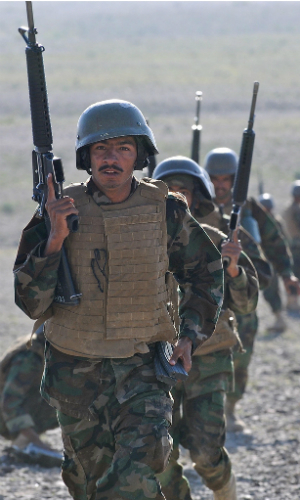The FP transcript (VI): What will Afghanistan look like in the long run?

[Here are Parts I, II, III, IV, and V]
Glasser:
Afghanistan is a very interesting question. Aside from the very early days of
pushing the Taliban out, which obviously was a military operation, or the
battle of Tora Bora or Shah-i-Kot,
since then there have been military operations certainly, but how would we
characterize in terms of as a war and then also what do we think of how the
U.S. military presence there will be remembered as? Is it going be "we
lost this war," or is it that it was a violent political conflict that
lasted for more than a decade and was unresolved?
Ricks: I'd like
to start by asking the historian and the Marine.
Crist: I agree
with General Dubik. We backed into this. That is the fundamental problem, is
the long-term strategy for a host of different reasons. I think we'll be
remembered as in some cases of duplicating a lot of the problems we've made in
our earlier wars, and then when we were faced with a crisis our natural
inclination, particularly in the U.S. military, is to fall back on doctrine. We
have a counterinsurgency doctrine -- if it worked in Iraq then it's going to
work in Afghanistan. And so you just sort of take that and transplant it as if
it's sort of a manual on how you're going to do that. And the problem with all
these wars is that they are all dependent on the dynamics, and they're
completely different. And so our response is a huge surge. Maybe it was the
right or wrong answer. I tend to think that it really ultimately didn't solve
much in Afghanistan, nothing like it did in Iraq, because the conditions were
different.
Alford: First
off, I think that we can look back in the future and say we succeeded. Not win
but. . . . . Because I do believe that we've spent enough time there, and the
transition we are getting ready to make is viable, I believe, from a partnered
operational design to an advisory piece and really get out of the way and let
them do it. I believe that their army -- in particular their army -- will be
able to keep it stable enough for this new government to muddle its way through
over the next few years. I think this third election -- a lot of people say the
second election in a new democracy is the most important -- it's the third
election here. And if it goes and people look at it as somewhat legitimate,
then they have a real chance, because the Taliban are not going to come
together as an army and take Kabul.
Ricks: Rajiv?
Chandrasekaran: I
think this in my view is going to likely wind up as some form of barely
satisfactory arrangement of sort of mildly unsatisfactory stalemate that will
not be seen as having been anywhere near worth the cost in dollars, and in
lives, and in limbs.
Look, I spent a lot of time in places where we surged troops
over the last several years. There is discrete impact. I've seen districts
where security has improved. It's incontrovertible. When you send in additional
numbers of U.S. troops, good things generally follow -- but for a discrete
period of time. We didn't achieve the sort of aggregate impact that we saw in
Iraq. And we all know the reasons why. Ultimately, I step back and say it was
not a wise expenditure of resources.
Stepping back even further, we fundamentally failed to grasp
the politics of that country [Afghanistan]. Our solutions were simply not
tailored to the environment. And ultimately I think in many parts of the
country -- it's already happening -- things will essentially revert back to
their natural order. And a natural order that may well in many parts of the
country be simply good enough for us. But could we have gotten to that natural
order without having spent as many hundreds of billions of dollars and as many
years as it has taken us to get there?
Alford: If we had
had the courage to make the shift four or five years ago? Absolutely. We took
some of the most decentralized people in the entire world and imposed one of
the most centralized constitutions on them. It's ludicrous that President
Karzai appoints a district governor and a district police chief. I'm telling
you, the people where I come from -- Rome, Georgia -- would rise up if the
president appointed the county commissioner. It's crazy.
Chandrasekaran:
Look, look, people criticize the United States for going around the world and
imposing democracy, and I think to myself, well only if we shared with people
the sort of democracy that made our country great. The Afghan Constitution on
paper centralizes power like no other state -- I suppose like North Korea. I
mean, it's crazy.
(More to come-first, about Syria and Libya)
Thomas E. Ricks's Blog
- Thomas E. Ricks's profile
- 436 followers



